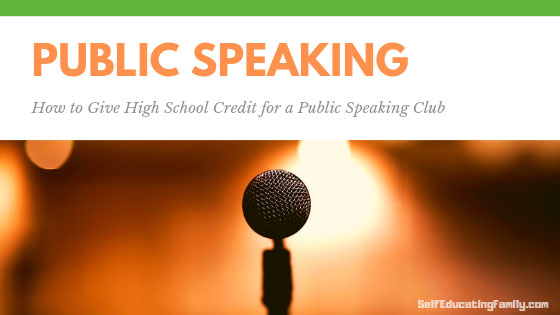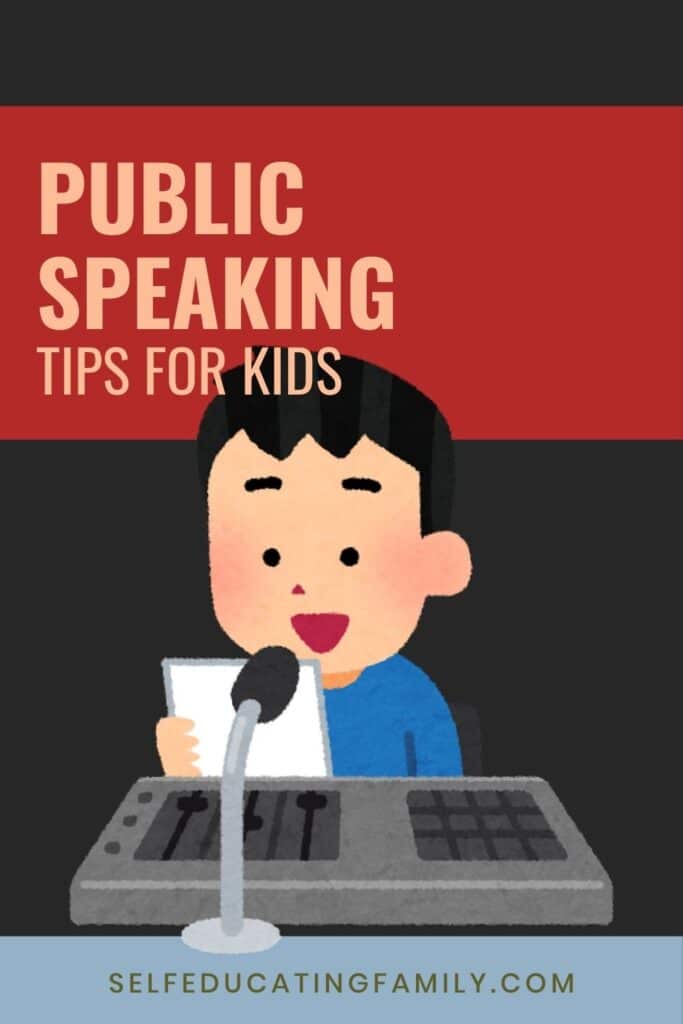What’s inside: Practical public speaking tips for anyone! Are you afraid of speaking in public? It’s a vital skill in today’s world. Help prepare your kids with this life skill. Read this speech by a homeschooling high school kid.
This post may contain affiliate links. If you find my content valuable and make a purchase through one of my links, I will earn a commission at no cost to you, which helps me keep this blog going so I can help you even more! I recommend products I trust and/or use myself, and all opinions I express are my own. Read the full disclaimer here.
Practical Tips on Public Speaking for Kids
In one of our speaking club sessions, we get a lot of great speeches on a wide variety of topics. Everything from “The Terrors of Homeschool Driver’s Ed” to the famous “Tastes Like Chicken” speech.
Tip for homeschooling high school: You can learn how to assess the credit you give for a course like speech club. Tracking high school credits starting in 9th grade helps when you make your transcripts.
Today’s post includes the following speech about speaking called “Public Speaking Tips for Kids”.
These tips are great for a sound foundation for speaking in public. And they are perfect for people learning speechcraft, like the middle and high schoolers we had in the club.
Speech: “Public Speaking Tips for Kids”
How many of you have heard of TED Talks? TED (Technology, Entertainment and Design) is a nonprofit devoted to spreading ideas, usually in the form of short, powerful talks (18 minutes or less).
Needless to say, they have some tips for great speaking. Which I have shamelessly stolen and will use for today’s theme of Public Speaking Tips for Kids.
List of Tips
Always give the audience something to take home
- Always give the audience something to take home. Pennies. Kidding!
- But Tonight, go home and think about how you can make your next speech have a “Take-away” by doing this and this… (Pass out pennies)
Fuel your mental engine
- Fuel your mental engine.. Dopamine and epinephrine help regulate mental alertness. Both come from tyrosine, an amino acid found in proteins.
- So make sure to include protein in the meal you eat before you need to be at your best.
Create two contingency plans
- Create two contingency plans.
- If you’re like me, “What if?” is your biggest source of anxiety: What if your PowerPoint presentation fails, someone constantly interrupts, or your opening falls flat? What will you do if the projector fails?
- Pick two of your biggest fears and create contingency plans.
Establish a pre-routine
- Establish a pre-routine.
- Superstitions are an attempt to “control” something we’re afraid of. (Lucky socks don’t make an athlete perform better.)
- Instead of creating a superstition, create a routine that helps center you emotionally. Walk the room ahead of time to check sight lines. Check microphone…
Pause for 10 seconds
- Pause for 10 seconds.
- Pause for two or three seconds and audiences assume you’ve lost your place; five seconds, they think the pause is intentional; after 10 seconds even the people texting can’t help looking up.
- When you start speaking again, the audience naturally assumes the pause was intentional … and that you’re a confident and accomplished speaker.
- A poor speaker abhors a vacuum; only confident speakers are secure with silence.
- Take one long pause to gather your thoughts and the audience will automatically give you speaker bonus points.
Share one thing no one knows
- Share one thing no one knows.
- No one says, “I was at this presentation the other day and the guy’s Gantt chart was amazing…”
- Better speakers say, “Did you know when you blush the lining of your stomach also turns red?”
- So, find a surprising fact or an unusual analogy that relates to your topic.
- Audiences love to cock their heads and think, “Really? Wow…”
Don’t make excuses
- Don’t make excuses.
- Now let’s look at a few things you should stop doing. Due to insecurity, many speakers open with an excuse: “I didn’t get much time to prepare”¦” or, “I’m not very good at this.”
- Excuses like this won’t make your audience cut you any slack, but they will make people think, Why are you wasting my time?”
- Do what you need to do to ensure you don’t need to make excuses.
Repetition
- Repetition.
- Always repeat yourself.
- Your audience probably hears about half of what you say, and then they filter that through their own perspectives.
- So create a structure that allows you to repeat and reinforce key points.
- First explain a point, then give examples of how that point can be applied, and at the end provide the audience with action steps they can take based on that point.
- Since no one can remember everything you say, what you repeat has a much greater chance of being remembered—and being acted upon. So repeat away!
- Always repeat audience questions. Always repeat the question and then answer it. It’s not only courteous, but it also provides you with a little more time to think of an awesome way to answer each question if you are giving an impromptu or unscripted response.
- Always repeat yourself.
End of Speech!
These speaking tips may not seem like the first things you need to know when you begin public speaking, but you’d be surprised at how these small items can make you seem like an expert once you begin practicing them.
Keep Learning
- Top Ted Talks on Public Speaking | Masterclass Ted
Related Posts










